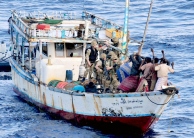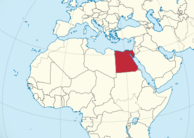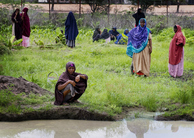|
International Affairs
Page 17/27 | Showing results 241 - 255 of 393
2011, Vol. 3 No. 09
Since the early 1990s, rampant piracy off the coast of Somalia has become a major issue for global trade and security, prompting strong responses from the international community. In 2010 alone, the collective cost of ransom money, military protection... Read Article »
2011, Vol. 3 No. 09
Of the European Union’s twenty-seven member states, no country is more sceptical of political and economic integration than Great Britain. The English are profoundly independent and inherently suspicious of their continental neighbours; an... Read Article »
2011, Vol. 3 No. 09
Today, approximately 50% of the world, over three billion people, lives on less than $2.50 U.S. dollars a day. Despite poverty’s wide reaching affects, little research has been conducted that compares the framing of international and domestic... Read Article »
2011, Vol. 3 No. 09
In the era since the removal of the monarchy in Egypt, a distance seems to have developed between the Egyptian people and the African aspect of their identity. This kind of sentiment has also been corroborated by Egypt’s elite such as Isma... Read Article »
2011, Vol. 3 No. 09
Volunteer conservation is a rapidly growing sub-sector of eco-tourism where fee-paying volunteers travel to developing countries to actively engage in conservation work (Cousins et al 2009b). As volunteers provide the labor and funding for these... Read Article »
2011, Vol. 2011/2012 No. 1
Among European states in the aftermath of the Second World War, multilateral cooperation was seen as a long term stabilisation for peace. The European Union (EU), since its establishment in 1957 as the European Coal and Steel Community with six... Read Article »
2011, Vol. 2011/2012 No. 1
To say the recent few years have not been the EU’s brightest would certainly be an understatement. There is so much eclecticism, topic deviation and “eurospeak” that one could forget what the EU really stands for. Just the list... Read Article »
2011, Vol. 3 No. 08
Development is closely linked to the idea of progress. Therefore the way in which progress is quantified, whether through economic, social or spiritual values, determines the way in which we conceptualize development (Power 2005). Religious beliefs... Read Article »
2011, Vol. 3 No. 08
Somalia is home to roughly 9 million people, the overwhelming majority of whom are ethnic Somalis (UN Statistics Division 2010). The country has been plagued with conflict and disorder beginning just years after it attained independence. Following... Read Article »
2011, Vol. 3 No. 08
The extraction of non-renewable natural resources in the form of large-scale mining projects has intensified in recent years in Latin America. In fact, the World Bank and other international financial institutions have continued to encourage countries... Read Article »
2011, Vol. 3 No. 06
The Israeli-Palestinian conflict is a perplexing problem that weighs heavily on the world. For over seventy-five years, blood has been spilt over a piece of land about the size of New Jersey. Numerous attempts have been made to find peace in what... Read Article »
2011, Vol. 3 No. 04
The problems associated with democratic reform in the Democratic Republic of the Congo (DRC) are manifold. While the name of the country surely lends itself to an assumption of regime type, in actuality, this area has experienced great civil unrest... Read Article »
2011, Vol. 3 No. 04
Following a successful war of liberation in 1962, Algeria successfully gained independence from France and an authoritarian social regime took power. The success of this government lasted into the 1980s, when Algeria's oil reserves began to decline... Read Article »
2011, Vol. 3 No. 04
This case study asks the following question: given the symbol of the European Union as the ultimate supranational, rights-based, compliance-inducing international organization, why have member states France and Italy escaped punishment for their... Read Article »
2011, Vol. 4 No. 2
Seymour Martin Lipset's, "the more well-to-do a nation, the greater chances that it will sustain democracy,"1 has set off over five decades of intense debate over the conditions most conducive to democratic transition and establishment. Variations... Read Article »

Expedited Article Review
Submit an article and get a decision fast.
If you need a fast decision, INQUIRIES Journal offers expedited processing of your submission for a small fee. Depending on the expedited review option you choose, you can receive a decision in as few as 5-days.
In addition to a shorter review period, the fee supports the journal's continued operation and open-access publishing model. Standard submissions are always free. Submit Now » - Submit an Article to Inquiries Journal -
|









